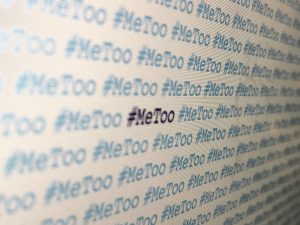What #MeToo Means for the Future of Sexual Assault
April 6, 2018
When one thinks about #MeToo, images come to mind of prominent male celebrities whose detestable behavior has been revealed by too many victims to count. The shocking headlines about seemingly well-respected men such as Matt Lauer and Al Franken implicated in multiple instances of sexual assault caught the attention of the American public.
The #MeToo movement quickly grew into a national phenomenon, and in a matter of weeks, the list of ousted Hollywood elites had grown exponentially. However, #MeToo leaves its most lasting legacy not through the exposure of past predators, but through the empowerment of a generation of victims to stand up against sexual assault for themselves.
To fully understand the depth of #MeToo, it is important to realize the context in which the movement took shape. For centuries, there have been systems in place in the United States that protect offenders, and make reporting sexual assault an uphill battle for the victim. The simple truth is that there has never been an accessible, enabling system in place for victims to report.
Victims have to deal with victim blaming, being treated differently by people around them and unhelpful law enforcement that is overwhelmingly unlikely to convict the perpetrator. This is along with the lower position of women in society that has long existed in the United States which causes victims to have such little hope in reporting.
#MeToo is vital because the overwhelming majority of sex offenders will experience no punishment for their crimes, even if they are reported. According to the United States Department of Justice, less than one in five reports of sexual assault results in an arrest. Furthermore, only six rapists will go to prison per one thousand rapes, less than one per every hundred rapes. Victims have no reason to believe that they will be helped by the judicial system, and for that reason, only about one in three rapes in the U.S. are reported.
Victims also struggle to find help from bystanders, since people who are aware of harassment often turn a blind eye. Larry Nassar, who worked as the USA gymnastics national team doctor and team doctor at Michigan State, was recently convicted of sexual assault against 160 women. Over the course of two decades, no fewer than eight of Nassar’s victims contacted fourteen Michigan State University representatives. The system that was put in place to protect students and victims at MSU failed to investigate these claims and stop Nassar. These victims wanted to tell their stories, but it was only through speaking out to a wider audience that they finally received justice.
#MeToo broke down the initial barriers and systems that worked against reporting sexual assault. By creating a means for victims to be emboldened and reassured as part of a community, #MeToo lessened the fearful stigma many associates with being a victim of sexual assault.
Victims cannot always rely on policing to bring them justice, but now they have a sense of hope and pride that many who have dealt with sexual assault did not have before the #MeToo movement. Although #MeToo will not end sexual assault, it has strengthened the resolve of victims to allow their voices be heard and to find justice.



